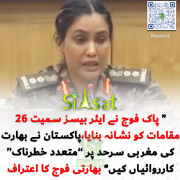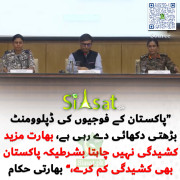Salik
Senator (1k+ posts)
Egypt:
Dozens arrested at Egypt protests
Organisers of a series of pro-democracy demonstrations in Egypt say police arrested about 75 people in connection with protests held across the country. The Kifaya movement says all but two of their activists were later released.
Events were held in 15 cities to call for an end to President Hosni Mubarak's presidency and the lifting of emergency laws imposed under his rule in 1981.
In Cairo, more than 1,000 riot police prevented about 300 protesters from approaching the Supreme Court.
In the southern city of Luxor, more than 1,000 people are said to have taken part in a protest.
Witnesses in some cities, including Suez and Benha, are quoted as saying police beat protesters with batons to disperse them.
The group has held a series of protests since December gradually attracting larger numbers of participants.
Kifaya says it will keep on protesting until the authorities release all those detained in demonstrations.
Police presence
BBC correspondent Heba Saleh at the scene of the Cairo demonstration said there was no sign of arrests.
Police, however, closed off the street in front of the journalists' syndicate where the protest took place.
Our correspondent saw more than 1,000 riot police in full riot gear surrounding the protesters.
Kifaya, meaning "enough" in Arabic, is a coalition of activists from different political backgrounds.
It includes leftists, nationalists and Islamists and its aim is to stop the president from standing for another term in office.
Mr Mubarak, under US pressure to undertake political reforms, said in an interview on Tuesday he had not decided whether he would run in the election due later this year.
Story from BBC NEWS:
http://news.bbc.co.uk/go/pr/fr/-/1/hi/world/middle_east/4490623.stm
Jordan:
Protesters demand Jordan's government step down
By ASSOCIATED PRESS
21/01/2011
Spurred on by the example of the popular uprising in Tunisia, Jordanians have staged growing protests in the past week.
AMMAN — Thousands of Jordanians calling for their government to step down marched in several cities Friday in an outpouring of anger over economic hardship and a lack of democratic reforms in the constitutional monarchy.
Spurred on by the example of the popular uprising in Tunisia, Jordanians have staged growing protests in the past week. The opposition movements that organized Friday's demonstrations vowed to keep up the pressure until Prime Minister Samir Rifai and his government resign.
RELATED:
Arab World: Here, we love our king
Anti-government protests gather steam in Jordan
Wary of the outcry, particularly over rising prices, Jordan's government has taken some steps to try to defuse the situation, including by announcing $125 million in subsidies on basic goods and fuel. The prime minister also announced a surprise pay increase for civil servants.
Protesters scoffed at the measures.
"They lie to the people. They reduce some things and increase others more," said Muslim Brotherhood demonstrator Suhair Asaaf, an electrical mechanic.
He was among more than 5,000 people demonstrating Friday in the capital, Amman, its suburb Zarqa and in the northern town of Irbid. The organizers of what was dubbed a "Day of Rage" represented a broad swath of Jordan's opposition, including the powerful Muslim Brotherhood, left-wing groups and trade unions.
Crowds chanted: "The Jordanian people are on fire. The government is cutting its people like a saw. Down, down Rifai."
The opposition groups are calling for reforms to allow Jordanians to elect their prime minister and the rest of the Cabinet rather than having them appointed by King Abdullah II.
Elections are held for Jordan's lower house of parliament as well as municipal councils and mayors.
Abdullah, a key US ally, ascended to the throne in 1999 vowing to transform his desert Arab kingdom into a model democracy in the Muslim world. But his reforms have been slow, as Jordan tries to limit Islamist influence.
Hamza Mansour, the head of the Islamic Action Front, the political arm of the Muslim Brotherhood, Jordan's largest opposition group, urged the king to make all branches of power independent.
"The king should be the guide, not the executor of the country's daily affairs," he said during the march.
Leftist Mohannad Safi called the government's limited reforms "window-dressing" to try to calm the people.
"This whole system of government must change. And we'll continue the protests until that happens," he said.
http://www.jpost.com/LandedPages/PrintArticle.aspx?id=204694
Algeria:
Tunisia's protests spark suicide in Algeria and fears through Arab world
Man burns to death in Algeria in echo of man's death that began Tunisian protests while Arab states are nervous
Ian Black Middle East editor
guardian.co.uk, Sunday 16 January 2011 20.45 GMT
Riots in Algeria, where a man burned himself to death in an apparent echo of a suicide that began the Tunisian protests. Photograph: Ap
Tunisia's "jasmine revolution" sent new shockwaves across north Africa today, with a copycat suicide protest reported in Algeria and official dismay in Libya.
Politicians met amid sporadic violence in Tunis to agree the formation of a new government. Maya Jribi, secretary-general of the opposition Progressive Democratic party, told the AFP news agency that an interim government, to be announced tomorrow, would include her party, Ettajdid (Renaissance), and the Democratic Front for Labour and Freedoms, as well as independent figures. Agreement was reportedly reached after talks between the parties and Mohamed Ghannouchi, prime minister under the deposed dictator Zine al-Abidine Ben Ali.
The European Pressphoto Agency announced the death of French photographer Lucas Mebrouk Dolega, 32, who was hit in the head by a police teargas canister on Friday. Up to 200 people are estimated to have been killed since the unrest began last month, including 42 prisoners who died in a fire on Saturday.
Earlier, Libya's Muammar Gaddafi expressed his "pain" that Ben Ali, who fled to Saudi Arabia on Friday, had not been allowed to step down in his own time, as he had belatedly offered – reflecting nervousness among other autocratic Arab leaders of a ripple effect that could embolden opposition forces across the region.
"You have suffered a great loss," Gaddafi, now in power for 41 years, said in a speech on state radio and TV. "There is none better than Zine to govern Tunisia. Tunisia now lives in fear."
Echoes of the unrest were also heard from Algeria, where a man burned himself to death in an apparent copycat suicide that echoed the young Tunisian Mohamed Bouazizi, whose death sparked off the trouble in mid-December.
Algeria's El Khabar newspaper reported that Mohsen Bouterfif set himself alight last Thursday after failing to find a job and a house. Riots erupted after he died of his burns on Saturday. A second, failed, attempted suicide by self-immolation was reported from Mostaganem, according to El Watan. In the past few weeks, Algerian towns have seen rioting over unemployment and a sharp rise in food prices. Two people were killed and scores injured during unrest which unfolded in parallel to the violence in Tunisia.
Analysts say the big question is whether Ben Ali's departure will now be followed by real regime change that brings divided opposition parties into power. "The fear is that the country's democratic transition will be a painful one," wrote Hacen Ouali in El-Watan.
Newspapers and comment across the Middle East focused on the lessons of Tunisia's drama for other countries. Terse statements from Egypt and several other Arab governments spoke of respecting the will of the Tunisian people. Saudi Arabia defended its much-criticised decision to take in Ben Ali, who is now with his family in a heavily guarded palace in Jeddah.
Egypt, Jordan, Algeria and Morocco are seen as the other countries most likely to face serious popular unrest over unemployment, corruption and hopelessness, though social, political and economic conditions vary considerably between them.
Arab opposition forces continued to hail Ben Ali's fall. The Beirut newspaper al-Akhbar saluted "the gift from Tunisia to Arabs: the end of a dictator" while Lebanon's Hezbollah urged Arab leaders to learn from the Tunisian protests.
In Syria, where the Bashar al-Assad regime is just as repressive, the pro-government daily al-Watan said events in Tunisia were "a lesson that no Arab regime should ignore, especially those following Tunisia's political approach of relying on 'friends' to protect them".
The Palestinian Islamist movement Hamas warned that the leadership of its PLO rival in the West Bank was likely to meet the same fate as Ben Ali.
"Mahmoud Abbas and his sons are among the wealthiest Palestinians," it said. "Fatah leaders are very corrupt. All indications are that the residents of the West Bank, who live under a tyrannical regime, are close to toppling the regime there."
guardian.co.uk Guardian News and Media Limited 2011
Yemen
Protests erupt in Yemen, president offers reform
Thu, Jan 20 2011
By Mohammed Ghobari and Mohamed Sudam
SANAA/ADEN (Reuters) - Thousands protested in southern Yemen on Thursday to reject political reforms proposed by the government, including a limit on presidential terms, saying they did not go far enough.
The government announced its reform plans in the face of growing discontent that sparked sporadic protests this week.
Opposition parties said they would meet on Saturday to discuss the offer, as thousands of people demonstrated in the southern town of Taiz.
President Ali Abdullah Saleh has ruled Yemen for over three decades.
"We want constitutional amendments but we want amendments that don't lead to the continuance of the ruler and the inheritance of power to his children," said Mohammed al-Sabry, head of the opposition coalition and the Islamist party Islah.
"We won't permit these corrupt leaders to stay in power and we are ready to sleep in the streets for our country's sake, in order to liberate it from the hands of the corrupt," Sabry said.
The protests come as Tunisia grapples with fallout from the overthrow of its long-time president Zine al-Abidine Ben Ali, who fled the country after weeks of violent unrest driven by social grievances.
Among the steps put forward by Saleh's ruling party, the General People's Congress, are amendments to guarantee presidential term limits of two seven- or five-year terms as well as voter registration for all Yemeni adults.
The opposition and protesters in Taiz said the reforms did not ensure that Saleh could not run again.
Protests in the south, where many cities are hotbeds of separatist sentiment, have been larger and more widespread than in the north. Several protests over unemployment and economic conditions took place in the southern port of Aden on Wednesday and demonstrators clashed with police.
Yemenis in the north said dwindling protest turnouts in the capital Sanaa meant widespread revolt was unlikely. Analyst Abdulkarim Salam in Sanaa said the tribal systems that dominate Yemeni life were the biggest impediment.
"Of course it's hard to know what will happen in the coming days, but the situation here is different because allegiances here lie first with tribes, clans or even families, " he said.
"LEAVE BEFORE YOU ARE FORCED TO LEAVE"
Yemen, the Arab world's poorest country, is facing soaring unemployment and the oil reserves that buoy its economy are dwindling. Almost half of its population of 23 million lives on $2 a day or less.
Two protests this week at Sanaa University criticized autocratic Arab leaders, including Saleh. Protesters held signs with the warning: "Leave before you are forced to leave."
The pan-Arab newspaper Asharq al-Awsat reported that an unemployed Yemeni youth set himself on fire in the southern province of Baidah on Wednesday, following the example of the young vegetable seller whose self-immolation inspired revolt in Tunisia and copycat acts in Egypt, Algeria and Mauritania.
The young man's father told state television that his son accidentally burned himself when their house caught fire, though some speculated the statement was made under pressure.
Yemen's government is also struggling to quell a resurgent wing of al Qaeda based in the country and cement a fragile truce with Shi'ite rebels in the north.
North and South Yemen united in 1990 under Saleh but the merger lead to a brief civil war in 1994. Many in the south, home to most of Yemen's oil wealth, say the state discriminates against them while exploiting their resources.
(Additional reporting by Mohammed Mukhashef; writing by Erika Solomon; editing by Andrew Roche)
Dozens arrested at Egypt protests
Organisers of a series of pro-democracy demonstrations in Egypt say police arrested about 75 people in connection with protests held across the country. The Kifaya movement says all but two of their activists were later released.
Events were held in 15 cities to call for an end to President Hosni Mubarak's presidency and the lifting of emergency laws imposed under his rule in 1981.
In Cairo, more than 1,000 riot police prevented about 300 protesters from approaching the Supreme Court.
In the southern city of Luxor, more than 1,000 people are said to have taken part in a protest.
Witnesses in some cities, including Suez and Benha, are quoted as saying police beat protesters with batons to disperse them.
The group has held a series of protests since December gradually attracting larger numbers of participants.
Kifaya says it will keep on protesting until the authorities release all those detained in demonstrations.
Police presence
BBC correspondent Heba Saleh at the scene of the Cairo demonstration said there was no sign of arrests.
Police, however, closed off the street in front of the journalists' syndicate where the protest took place.
Our correspondent saw more than 1,000 riot police in full riot gear surrounding the protesters.
Kifaya, meaning "enough" in Arabic, is a coalition of activists from different political backgrounds.
It includes leftists, nationalists and Islamists and its aim is to stop the president from standing for another term in office.
Mr Mubarak, under US pressure to undertake political reforms, said in an interview on Tuesday he had not decided whether he would run in the election due later this year.
Story from BBC NEWS:
http://news.bbc.co.uk/go/pr/fr/-/1/hi/world/middle_east/4490623.stm
Jordan:
Protesters demand Jordan's government step down
By ASSOCIATED PRESS
21/01/2011
Spurred on by the example of the popular uprising in Tunisia, Jordanians have staged growing protests in the past week.
AMMAN — Thousands of Jordanians calling for their government to step down marched in several cities Friday in an outpouring of anger over economic hardship and a lack of democratic reforms in the constitutional monarchy.
Spurred on by the example of the popular uprising in Tunisia, Jordanians have staged growing protests in the past week. The opposition movements that organized Friday's demonstrations vowed to keep up the pressure until Prime Minister Samir Rifai and his government resign.
RELATED:
Arab World: Here, we love our king
Anti-government protests gather steam in Jordan
Wary of the outcry, particularly over rising prices, Jordan's government has taken some steps to try to defuse the situation, including by announcing $125 million in subsidies on basic goods and fuel. The prime minister also announced a surprise pay increase for civil servants.
Protesters scoffed at the measures.
"They lie to the people. They reduce some things and increase others more," said Muslim Brotherhood demonstrator Suhair Asaaf, an electrical mechanic.
He was among more than 5,000 people demonstrating Friday in the capital, Amman, its suburb Zarqa and in the northern town of Irbid. The organizers of what was dubbed a "Day of Rage" represented a broad swath of Jordan's opposition, including the powerful Muslim Brotherhood, left-wing groups and trade unions.
Crowds chanted: "The Jordanian people are on fire. The government is cutting its people like a saw. Down, down Rifai."
The opposition groups are calling for reforms to allow Jordanians to elect their prime minister and the rest of the Cabinet rather than having them appointed by King Abdullah II.
Elections are held for Jordan's lower house of parliament as well as municipal councils and mayors.
Abdullah, a key US ally, ascended to the throne in 1999 vowing to transform his desert Arab kingdom into a model democracy in the Muslim world. But his reforms have been slow, as Jordan tries to limit Islamist influence.
Hamza Mansour, the head of the Islamic Action Front, the political arm of the Muslim Brotherhood, Jordan's largest opposition group, urged the king to make all branches of power independent.
"The king should be the guide, not the executor of the country's daily affairs," he said during the march.
Leftist Mohannad Safi called the government's limited reforms "window-dressing" to try to calm the people.
"This whole system of government must change. And we'll continue the protests until that happens," he said.
http://www.jpost.com/LandedPages/PrintArticle.aspx?id=204694
Algeria:
Tunisia's protests spark suicide in Algeria and fears through Arab world
Man burns to death in Algeria in echo of man's death that began Tunisian protests while Arab states are nervous
Ian Black Middle East editor
guardian.co.uk, Sunday 16 January 2011 20.45 GMT
Riots in Algeria, where a man burned himself to death in an apparent echo of a suicide that began the Tunisian protests. Photograph: Ap
Tunisia's "jasmine revolution" sent new shockwaves across north Africa today, with a copycat suicide protest reported in Algeria and official dismay in Libya.
Politicians met amid sporadic violence in Tunis to agree the formation of a new government. Maya Jribi, secretary-general of the opposition Progressive Democratic party, told the AFP news agency that an interim government, to be announced tomorrow, would include her party, Ettajdid (Renaissance), and the Democratic Front for Labour and Freedoms, as well as independent figures. Agreement was reportedly reached after talks between the parties and Mohamed Ghannouchi, prime minister under the deposed dictator Zine al-Abidine Ben Ali.
The European Pressphoto Agency announced the death of French photographer Lucas Mebrouk Dolega, 32, who was hit in the head by a police teargas canister on Friday. Up to 200 people are estimated to have been killed since the unrest began last month, including 42 prisoners who died in a fire on Saturday.
Earlier, Libya's Muammar Gaddafi expressed his "pain" that Ben Ali, who fled to Saudi Arabia on Friday, had not been allowed to step down in his own time, as he had belatedly offered – reflecting nervousness among other autocratic Arab leaders of a ripple effect that could embolden opposition forces across the region.
"You have suffered a great loss," Gaddafi, now in power for 41 years, said in a speech on state radio and TV. "There is none better than Zine to govern Tunisia. Tunisia now lives in fear."
Echoes of the unrest were also heard from Algeria, where a man burned himself to death in an apparent copycat suicide that echoed the young Tunisian Mohamed Bouazizi, whose death sparked off the trouble in mid-December.
Algeria's El Khabar newspaper reported that Mohsen Bouterfif set himself alight last Thursday after failing to find a job and a house. Riots erupted after he died of his burns on Saturday. A second, failed, attempted suicide by self-immolation was reported from Mostaganem, according to El Watan. In the past few weeks, Algerian towns have seen rioting over unemployment and a sharp rise in food prices. Two people were killed and scores injured during unrest which unfolded in parallel to the violence in Tunisia.
Analysts say the big question is whether Ben Ali's departure will now be followed by real regime change that brings divided opposition parties into power. "The fear is that the country's democratic transition will be a painful one," wrote Hacen Ouali in El-Watan.
Newspapers and comment across the Middle East focused on the lessons of Tunisia's drama for other countries. Terse statements from Egypt and several other Arab governments spoke of respecting the will of the Tunisian people. Saudi Arabia defended its much-criticised decision to take in Ben Ali, who is now with his family in a heavily guarded palace in Jeddah.
Egypt, Jordan, Algeria and Morocco are seen as the other countries most likely to face serious popular unrest over unemployment, corruption and hopelessness, though social, political and economic conditions vary considerably between them.
Arab opposition forces continued to hail Ben Ali's fall. The Beirut newspaper al-Akhbar saluted "the gift from Tunisia to Arabs: the end of a dictator" while Lebanon's Hezbollah urged Arab leaders to learn from the Tunisian protests.
In Syria, where the Bashar al-Assad regime is just as repressive, the pro-government daily al-Watan said events in Tunisia were "a lesson that no Arab regime should ignore, especially those following Tunisia's political approach of relying on 'friends' to protect them".
The Palestinian Islamist movement Hamas warned that the leadership of its PLO rival in the West Bank was likely to meet the same fate as Ben Ali.
"Mahmoud Abbas and his sons are among the wealthiest Palestinians," it said. "Fatah leaders are very corrupt. All indications are that the residents of the West Bank, who live under a tyrannical regime, are close to toppling the regime there."
guardian.co.uk Guardian News and Media Limited 2011
Yemen
Protests erupt in Yemen, president offers reform
Thu, Jan 20 2011
By Mohammed Ghobari and Mohamed Sudam
SANAA/ADEN (Reuters) - Thousands protested in southern Yemen on Thursday to reject political reforms proposed by the government, including a limit on presidential terms, saying they did not go far enough.
The government announced its reform plans in the face of growing discontent that sparked sporadic protests this week.
Opposition parties said they would meet on Saturday to discuss the offer, as thousands of people demonstrated in the southern town of Taiz.
President Ali Abdullah Saleh has ruled Yemen for over three decades.
"We want constitutional amendments but we want amendments that don't lead to the continuance of the ruler and the inheritance of power to his children," said Mohammed al-Sabry, head of the opposition coalition and the Islamist party Islah.
"We won't permit these corrupt leaders to stay in power and we are ready to sleep in the streets for our country's sake, in order to liberate it from the hands of the corrupt," Sabry said.
The protests come as Tunisia grapples with fallout from the overthrow of its long-time president Zine al-Abidine Ben Ali, who fled the country after weeks of violent unrest driven by social grievances.
Among the steps put forward by Saleh's ruling party, the General People's Congress, are amendments to guarantee presidential term limits of two seven- or five-year terms as well as voter registration for all Yemeni adults.
The opposition and protesters in Taiz said the reforms did not ensure that Saleh could not run again.
Protests in the south, where many cities are hotbeds of separatist sentiment, have been larger and more widespread than in the north. Several protests over unemployment and economic conditions took place in the southern port of Aden on Wednesday and demonstrators clashed with police.
Yemenis in the north said dwindling protest turnouts in the capital Sanaa meant widespread revolt was unlikely. Analyst Abdulkarim Salam in Sanaa said the tribal systems that dominate Yemeni life were the biggest impediment.
"Of course it's hard to know what will happen in the coming days, but the situation here is different because allegiances here lie first with tribes, clans or even families, " he said.
"LEAVE BEFORE YOU ARE FORCED TO LEAVE"
Yemen, the Arab world's poorest country, is facing soaring unemployment and the oil reserves that buoy its economy are dwindling. Almost half of its population of 23 million lives on $2 a day or less.
Two protests this week at Sanaa University criticized autocratic Arab leaders, including Saleh. Protesters held signs with the warning: "Leave before you are forced to leave."
The pan-Arab newspaper Asharq al-Awsat reported that an unemployed Yemeni youth set himself on fire in the southern province of Baidah on Wednesday, following the example of the young vegetable seller whose self-immolation inspired revolt in Tunisia and copycat acts in Egypt, Algeria and Mauritania.
The young man's father told state television that his son accidentally burned himself when their house caught fire, though some speculated the statement was made under pressure.
Yemen's government is also struggling to quell a resurgent wing of al Qaeda based in the country and cement a fragile truce with Shi'ite rebels in the north.
North and South Yemen united in 1990 under Saleh but the merger lead to a brief civil war in 1994. Many in the south, home to most of Yemen's oil wealth, say the state discriminates against them while exploiting their resources.
(Additional reporting by Mohammed Mukhashef; writing by Erika Solomon; editing by Andrew Roche)
Last edited:































